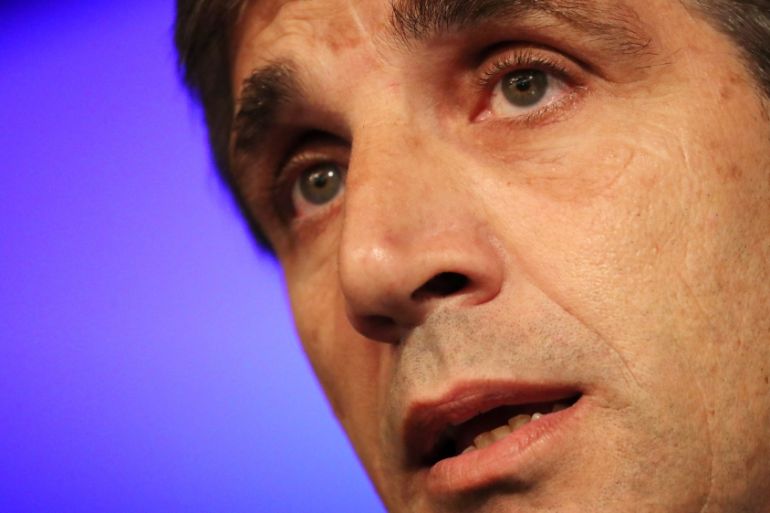Argentina’s central bank chief resigns amid IMF bailout talks
Luis Caputo’s resignation comes as President Mauricio Macri is negotiating additional IMF funding.

The president of Argentina‘s central bank has resigned amid negotiations with the International Monetary Fund (IMF) to bail the South American country out of its volatile economic crisis.
Luis Caputo abruptly quit on Tuesday after just a few months in the position, with a statement from the bank saying it was for “personal reasons”.
The resignation comes as President Mauricio Macri is negotiating additional IMF funding, three months after securing a $50bn loan from the international lender to stabilise Argentina’s economy.
Caputo is considered close to the centre-right Macri and was finance minister before he was appointed president of the central bank in June.
The bank statement announcing Caputo’s resignation said he was doing so with the conviction that a “new agreement with the International Monetary Fund will restore confidence in the fiscal, financial, monetary and exchange situation”.
But analysts said there were already rumours he would resign because of “a disagreement with the IMF over monetary policy”, according to Argentine economist Gabriel Rubinstein.
Another economist, Fausto Spotorno, told the AFP news agency Caputo was never seen as a long-term fixture and “the government’s priority is an agreement with the IMF”.
Macri is currently in New York City attending the United Nations General Assembly, while back home discontent grew as a 24-hour general strike paralysed the country.
On Monday, thousands of people marched on the streets of the capital, Buenos Aires, against the austerity measures expected to be introduced by Macri in order to receive the IMF’s biggest ever bailout.
Many in Argentina blame the financial body for the country’s worst-ever financial crisis between 2001 and 2002, which left one out of every five people unemployed and thrust millions into poverty.
|
|
Peso plunge
Argentina’s weak economy has been hit by a sharp depreciation of its peso currency and high inflation, forcing the government to reach out to the IMF for help.
After a crisis of confidence beginning in April saw the peso plunge, Argentina negotiated a $50bn bailout loan from the IMF that included an initial $15bn tranche in June.
But that failed to prop up the currency and Macri announced in August he would be seeking an accelerated disbursement of the remainder of the funds that were initially to be transferred over a three-year period.
That sparked two days of damaging drops in the value of the peso, which lost 20 percent against the dollar. For the year, it is down about 50 percent.
Macri responded by announcing new, and unpopular, austerity measures including halving the number of government ministries and restoring taxes on grain exports.
The central bank hiked interest rates to a world-high 60 percent and the peso has remained largely stable since its sudden crash in August.
But restoring faith in the peso has proved difficult with sceptical Argentines believed to be holding $300bn outside of the country’s fiscal circuit, either in cash or abroad, in a bid to protect their assets from the peso’s woes.